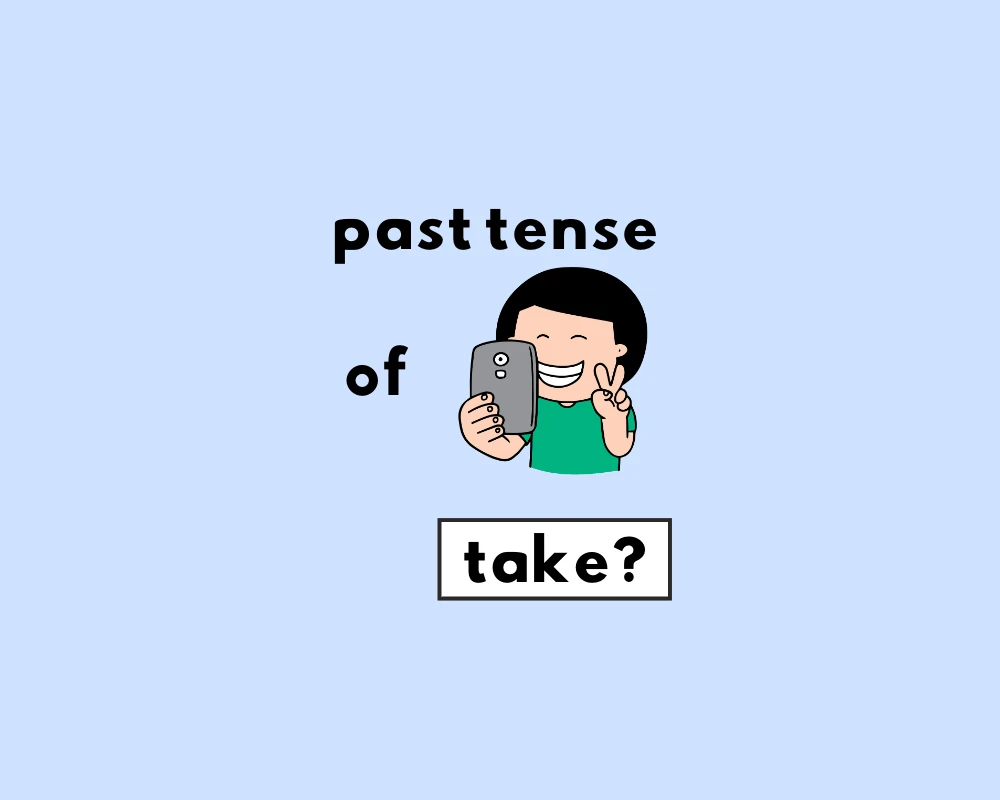Contents
Toggle
What’s the past tense of “take”? Took or taken?
Have you taken the slice of cake home to eat it later? Or have you recently watched Taken with Liam Neeson? If the movie didn’t explain the grammatical aspects of the verb, to take, then allow us to fill in the blanks.
So, here’s a hot take: if the sentence, ‘have you took the slice of cake home?’ reads correctly to you, chances are you need to flex your grammar more often. No sweat—you’re in the write place. Today’s topic: what’s the past tense of the verb take? Also, what’s the difference between the past tense, took, and the past participle verb form, taken? For your information, Taken, with Liam Neeson, is technically a proper noun (once you read this post, you can take a look at the one on proper nouns, here: it features Evan Peters and Queen Elizabeth II).
What does the word take mean?
To start with a definition, the verb take is understood as ‘to move something or someone from one place to another’. As in, ”don’t forget to take an extra pair of shoes! ” Or, ‘did you make sure to take your lunch with you to school?‘
1. To take is the present tense: I take my dog on a walk every morning and evening.
2. Took is the simple past: We took my mother for a drive in the country.
3. Taken is the past participle: The cat had to be taken to the vet.
Here’s a chart with verb forms similar to take/took/taken, insofar as they also have three verb forms in total (and are irregular verbs that do not end in –ed in their past verb forms):
| base verb | past tense | past participle |
| give | gave | given |
| take | took | taken |
| draw | drew | drawn |
| eat | ate | eaten |
| drink | drank | drunk |
Verb conjugations of take
| present | past | future | |
| simple | I take | I took | I will take |
| continuous | I am taking | I was taking | I will be taking |
| perfect | I have taken | I had taken | I will have taken |
| perfect continuous | I have been taking | I had been taking | I will have been taking |
Compare these sentences:
Past tense: We took him to catch his train.
Past participle: He was taken to the hospital by ambulance.
The difference is this: ‘we took him to catch his train’ is correct English; ‘we taken him to catch his train’, on the other hand, is not proper English. What’s missing in the second sentence, or what is present such that the sentence is no longer written in correct English?
The participle forms of verbs use auxiliary or helper verbs (like has, was, have, etc.) to create other tenses, like the present perfect, past perfect and past perfect continuous. But there’s a quick way to differentiate between the simple past and one of the perfect/progressive tenses: by looking for an auxiliary verb . . . because participles without auxiliary don’t make tense . . . sense.
“Take”, used in sentences
1. On long journeys I always take my dog along.
2. Take Debbie this cup of coffee, will you?
3. Let’s take the presents to them tonight.
4. Remember to take a pen with you.
5. Don’t forget to take an extra pair of shoes.
“Took”, used in sentence examples
1. We took him to catch his train.
2. We took the plants into the greenhouse.
3. The steps took us up to a cave in the cliff.
4. We took my mother for a drive in the country.
5. Bank robbers took the manager hostage overnight.
“Taken”, used in sentences
1. She has taken that flight many times.
3. He was taken to the hospital by ambulance.
4. I have already taken a look and I still can’t decide.
5. We had taken the train to the other side of town before going to the school.
Synonyms of take
- bring
- carry
- transfer
- deliver
- bring along
- grasp
- clutch
- hold
Origin of the verb take
From etymology online on take (v.):
late Old English tacan “to take, seize,” from a Scandinavian source (such as Old Norse taka “take, grasp, lay hold,” past tense tok, past participle tekinn; Swedish ta, past participle tagit), from Proto-Germanic *takan-.
Practice questions: verb forms of ‘take’
| Questions | Answer options: |
| 1. True or false: “Take” is a regular verb. | a. true b. false |
| 2. True or false: Regular verbs end in “ed” to denote the past. | a. true b. false |
| 3. True or false: The verb, “take” looks the same in the present and past. | a. true b. false |
| 4. Which tense is this sentence in: I took the keys! | a. simple past b. present perfect c. past perfect |
| 5. The sentence is in which tense: I will be taking 5 classes next semester. | a. future continuous b. present continuous c. past continuous |
| 6. Choose the to complete the sentence: I’ve ___ that route before. | a. take b. taken c. have taken |
Answers
- b
- b
- b
- a
- a
- b
Read about other irregular verbs
- What’s the Past Tense of Begin?
- What’s the Past Tense of Lose?
- What is the Past Tense of Teach?
- What’s the Past Tense of Read?
- What’s the Past Tense of Seek? Seeked or Sought?
- What’s the Past Tense of Buy? Brought or Bought?
- Take, Took, or Taken: What’s the Correct Past Tense of Take?
Sources
- Harper, Douglas. “Etymology of take.” Online Etymology Dictionary, https://www.etymonline.com/word/take. Accessed 14 January, 2023.
- “Take.” Merriam-Webster.com Dictionary, Merriam-Webster, https://www.merriam-webster.com/dictionary/take. Accessed 14 Jan. 2023.
- Wikipedia contributors. “Auxiliary verb.” Wikipedia, The Free Encyclopedia. Wikipedia, The Free Encyclopedia, 27 Oct. 2022. Web. 15 Jan. 2023.











